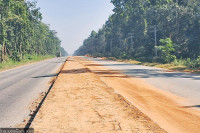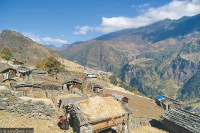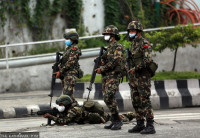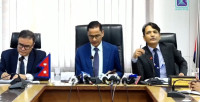National
Big problems bedevil Nepal’s biggest university
Political interference is at the root of Tribhuvan University’s most recent troubles.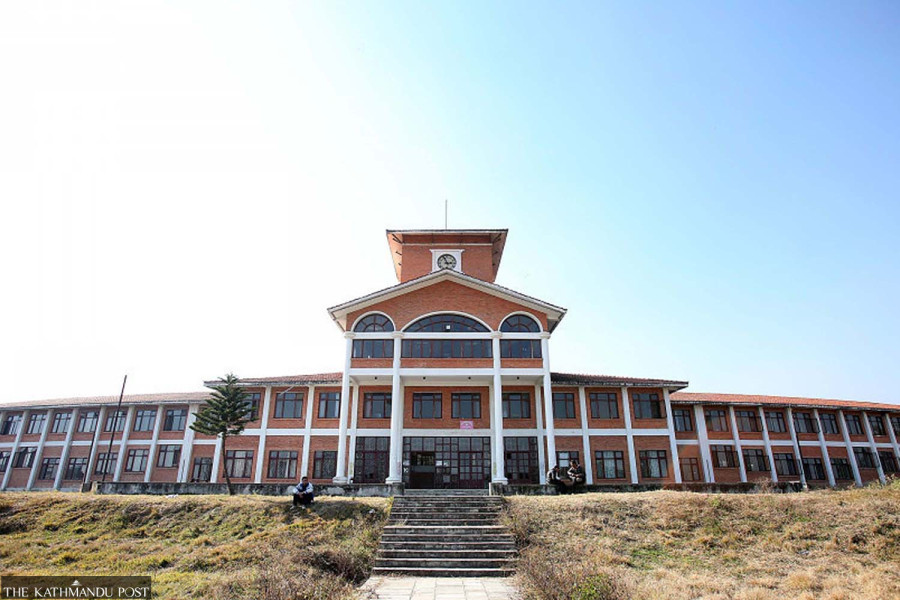
Nishan Khatiwada
Tribhuvan University, Nepal’s oldest, has now been padlocked for months.
Frequent protests by student organisations, including those close to the ruling parties, to press their demands including action against corrupt officials, have affected day-to-day operations of the university and classes.
What is more concerning is, these protests are unlikely to end anytime soon.
A snapshot
The Nepal Students’ Union (NSU), an organisation close to Nepali Congress, vandalised the vice-chancellor’s office inside the university premises at Kirtipur on August 24. Protesting students barged into the vice-chancellor’s office, placed a garland of shoes in his chair and tore down his nameplate.
The NSU has accused TU officials of concealing an investigative report on a question-paper leak. The union leaders are demanding that the university make the report public.
In June this year, question papers of the MA Economics third semester and Political Science first semester were repeated in TU exams.
Following the June incident, the All Nepal National Independent Students Union (Revolutionary), which is affiliated to the CPN (Maoist Centre), launched protests by padlocking the Economics and Political Science departments. The union withdrew its protest after the university formed a committee to investigate the incident. But the university, citing security reasons, did not make public the committee’s report and said it has initiated action against those responsible for the repetition.
Then the NSU resumed its protests on July 11, accusing university officials of carelessness in conducting exams and padlocked several offices of the university.
In the course of their protests, NSU leaders on August 26 broke into the TU executive council meeting at Hotel Yellow Pagoda at Durbar Marg and seized the minutes. The meeting was held at the hotel as the students had padlocked the university registrar’s office, according to officials.
After the incident, TU Section Officer Ratna Maharjan tried to file a complaint against the NSU leaders at the Durbarmarg Police Circle. However, the police refused to register the complaint, officials say.
The student leaders have reportedly handed over the seized documents to Education Minister Devendra Poudel.
Following continuous protests by student leaders, the TU administration organised a press conference on August 28. Vice-chancellor Dharma Kanta Baskota complained at the conference that there is no working environment at the university.
“The university’s various offices have been padlocked for a total of over 300 days. There are complaints of various groups at the university demanding donations and money in the name of economic help. Such groups have even beaten up teachers and staff,” he said.

Ahead of the press meet, a police officer and two students were injured in a clash between the protesting Nepal Students’ Union activists and those from the ANNFSU who had staged a counter-protest. The ANNFSU is the student wing of the main opposition CPN-UML.
Meanwhile, the Maoist Centre-affiliated ANNISU-R launched a weeklong ‘Save the TU Campaign’ on August 31 to put pressure on the university administration to introduce reforms. Their demands included removing the padlocks at the offices, resumption of all classes, and improvement in amenities including drinking water and lights.
The NSU has locked the registrar's office for around a month. This has disrupted the payment of staff salaries, utility bills and voluntary retirement packages.
Many political leaders have also expressed their concerns over the matter.
In the House of Representatives on August 29, the UML accused the government of supporting the illegal activities of the NSU, the Congress’ student wing. “The university chancellor is the prime minister himself. What will happen if the government itself promotes gangsterism at the university?” said Pradeep Gyawali, a UML leader, speaking in Parliament.
The university has already asked the Home Ministry to provide security at the university.
Despite requests by TU officials to Prime Minister and chancellor Sher Bahadur Deuba to intervene to stop the protests, the padlocking continues.
Speaking at a function in Kathmandu on Friday, Prime Minister Deuba said that the problems at the university cannot be resolved through strikes and padlocking. “Creative deliberations are needed to solve the problems,” he said.
Student organisations’ discontent
Student organisations like the NSU are dissatisfied with the TU leadership since the appointment of Baskota as vice-chancellor. NSU leaders say the way he was appointed was wrong as he was not a suitable candidate based on rank and seniority.

According to NSU leaders, Baskota was appointed by then-prime minister KP Sharma Oli and problems started soon after. “The university started facing problems after he took office—the management has gotten weaker and students’ problems and issues have been largely ignored,” said Ganesh Bhandari, acting president of the university NSU committee.
Since the beginning, they have been submitting memorandums, conducting hunger strikes, and padlocking the university’s offices demanding reforms. “But the TU leadership has always lent a deaf ear,” Bhandari told the Post.
The NSU leaders accuse the vice-chancellor of politicizing the administration to serve his vested interests. In the initial days, their demands included conduct of elections for the Free Students’ Union, implementation of the TU calendar as well as the agreements reached between the students and the TU. Now, they are demanding that the report of investigation into the question of paper repetition be made public and action be taken against the officials involved.
“We are ready to sit for talks to resolve the issues, but the administration has been ignoring our demands,” said Bhandari.
Pancha Singh, the ANNISU-R president, said they have realized that padlocking and disturbing day-to-day operation is a blunt instrument with which to put pressure on the administration. Despite the padlocking and protests, TU officials have not held talks with any of the protesting student unions, according to her.
“The university should arrange to end the practice of students from remote districts needing to come to Kathmandu for certificates, red-tapism at the university, and take action against those involved in question paper repetition, among other things,” she told the Post on Friday. “Through our ‘Save the TU campaign,’ we also want to give a message that the ongoing padlocking and disruptions are not proper ways of protest.”

TU officials’ defence
University officials, however, say they have already punished the perpetrators involved in the question-paper repetition and allege that the student organisations’ other demands such as a share for them in university appointments are unjustified.
“Those guilty in the question paper leak have been barred from preparing questions for three years,” said a TU official requesting anonymity.
However, their names cannot be made public, for security reasons, according to the official.
According to the official, a group within the NSU is continuously involved in creating disturbances through vandalism and protests.
What experts say
Experts claim that political influence is a major reason behind the current problems at the university and steady decline in the study environment.
Medin Lamichhane, an education expert, said political interference is one of the biggest problems at the university. “There are so many problems including the delay in the publication of exam results and issues related to question papers. With such problems, what type of manpower will it produce?” he questioned.
According to him, the major obstacle is political interference in university leadership and appointments. “Obviously, those appointed through such a process will be loyal to the respective political parties and this affects the selection and appointment of lecturers. The political effects will trickle down to all lower levels including the students. This is what is happening at the TU at present,” he said.
Meena Vaidya Malla, a professor and former head of the Department of Political Science at TU, said the current state of Nepal’s oldest university is pitiable. “Political interference has badly hit the quality of its education and services. Political affiliations influence every appointment. Academic people should be neutral and should have academic objectives,” she told the Post.
Resorting to padlocking and violent protests is wrong and will benefit no one, experts say.
“Student unions backed by political parties engage in such activities as a show of their power and influence,” added Lamichhane.
According to Malla, the problem at the university is a national issue and should be sorted out with utmost urgency.




 9.44°C Kathmandu
9.44°C Kathmandu

